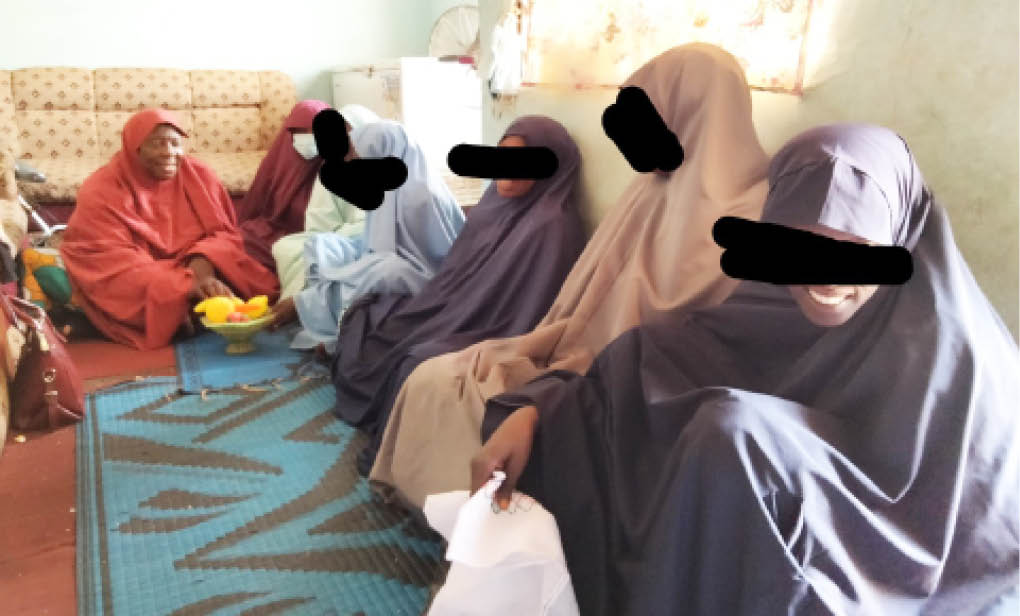Widows, orphans living with HIV commence Ramadan amidst want
The holy month of Ramadan is usually greeted with enthusiasm in the hope that one’s sins would be forgiven by Almighty Allah. But while others rejoice, people living with HIV/AIDS are worried about how they would cope as their lack of proper food and nutrition may worsen their condition. Arewa Trust Weekly gathered that people […]

Coordinator, People Living with HIV/AIDS Rigasa Support Group, Hajiya Aisha Usman in red hijab, discussed with some members during their meeting in Rigasa recently
The holy month of Ramadan is usually greeted with enthusiasm in the hope that one’s sins would be forgiven by Almighty Allah. But while others rejoice, people living with HIV/AIDS are worried about how they would cope as their lack of proper food and nutrition may worsen their condition.
Arewa Trust Weekly gathered that people living with HIV/AIDS need good nutrition because of the strong antiretroviral drugs they take twice daily to keep the disease at bay.
The Coordinator of Widows and Orphans Living with HIV/AIDS support group in Rigasa, Igabi LGA of Kaduna State, Aisha Usman, explained that the month of Ramadan is the most trying period for those living with the disease, adding that “many of us fall ill after fasting with some losing their lives due to lack of food and proper nutrition.”
Aisha, who is the first Muslim woman to reveal her HIV/AIDS status in Kaduna and is the Ambassador of the Nigeria Network of Religious Leaders Living with or Personally Affected by HIV/AIDS (NINERELA+), said many women living with HIV/AIDS have been forced into poverty because people shun them when they know their status.
“We task ourselves and the money realised is given as soft loans for members which is in turn given to someone else when repaid. However, it is very difficult because as soon as members of the community are aware of our status, they shun us and stop patronising us, leaving us in a web of poverty,” she said.
She said in the last 25 years, women living with HIV have been meeting fortnightly, adding that every meeting was conducted in a different member’s house so that they can form a bond. “At the meeting, we discuss our challenges, how to get our drugs, what business we should engage in and other sundry issues affecting our children,” she said.
Aisha further explained that not all members attend the meeting due to lack of transport fare adding that they face similar challenge when it is time to collect their drugs at 44 Nigerian Army Hospital. “What I do is, I collect their hospital cards and help them collect the drugs when I go to get mine,” she said.
“As fasting approaches, we have mixed feelings; while we are happy the month of forgiveness is here, we are also worried about how we will survive the 29 or 30 days because after many hours of fasting and we do not get proper food to eat, we usually collapse due to lack of nutrition.”
She called on well-to-do individuals to consider people living with HIV/AIDS and their children during the month of Ramadan saying, “many times, people forget about us when it comes to helping the needy and less privileged in the society.”
A member of the support group, Magajiya Suleiman, a mother of four who sells fruits said: “It has been very challenging for me and my children that is why I hide my status in order to earn a living and protect my children from bullying and stigmatization.”
On her part, Ramatu Yunusa, a widow and mother of five who makes kuli-kuli for sale said: “Only my first daughter knows my status for fear of stigmatisation. My husband is dead and I have been left to cater for the children.”
The story is not different for Aisha Isah, Rakiya Zubairu, Fatima Yusuf and Rabi Abubakar who have been struggling to make a living through business frustrated by stigmatisation.
